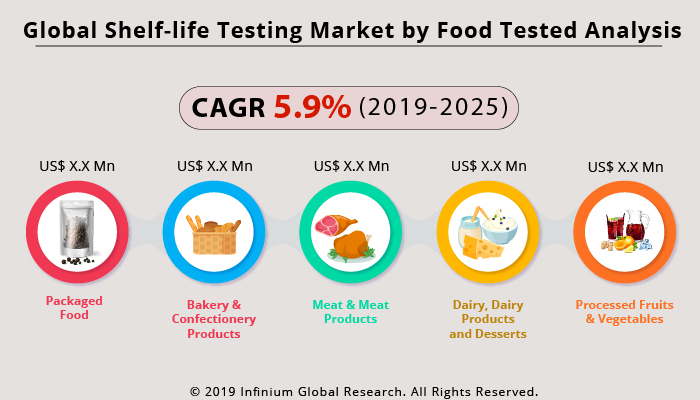Shelf-life Testing Market (Parameter - Microbial Contamination, Nutrient Stability, Organoleptic Properties, and Other Parameters; Food Tested - Packaged Food, Bakery & Confectionery Products, Meat & Meat Products, Dairy, Dairy Products and Desserts, and Processed Fruits & Vegetables; Method - Real-time Shelf Life Testing, Accelerated Shelf-life Testing; Technology - Equipment- & Kit-based, Manual Tests): Global Industry Analysis, Trends, Size, Share and Forecasts to 2025
Report Code: FB00164
Category: Food & Beverages
Published: July, 2019
A recent report published by Infinium Global Research on the shelf-life testing market provides an in-depth analysis of segments and sub-segments in the global as well as a regional shelf-life testing market. The study also highlights the impact of drivers, restraints, and macro indicators on the global and regional shelf-life testing market over the short term as well as long term. The report is a comprehensive presentation of trends, forecast and dollar values of the global shelf-life testing market. According to the report, the global shelf-life testing market is projected to grow at a CAGR of 5.9% over the forecast period of 2019-2025.
Market Insight
The continuous growing demand for FMCG products around the world is necessitating to measure the life of the products. Further, the growing governments' rules and regulations about the FMCG products is boosting the growth of the demand for shelf-life testing products. These products help to precisely measure the product lifetime and facilitate to know when the products are unsafe to use. Several fast-moving consumer goods as meat, fruits, packaged foods, dairy products, beverage, toiletries have a very short life span, and there is a chance that these products may be used after the end of its normal life span, if consumers are not informed well, and can attract heavy penalty for the companies. Hence, the shelf-life testing equipment help to precisely know about when its life will expire. The growing incidence of the severe negligence by the FMCG manufacturing companies to sell their products after the expiry of the normal lifetime of the products has created several problems among the consumers and forced the government in the developing countries to promulgate the stringent measure to control the menace of the FMCG companies.
The growing consumer awareness about the FMCG products, its availabilities, and the life span of the products is forcing the FMCG manufacturing companies to adopt a pro-consumer attitude to sell their products. This pro-consumer attitude not only helps them to save from legal and financial penalties but also to improve their social and brand image among the consumers. However, the lax attitude of the government and the casual attitude of the manufacturers is hampering the growth of the shelf-life testing product market.
Geographically, the shelf-life testing market is divided into four regions namely North America, Europe, the Asia Pacific and RoW. North America is the largest market of the shelf-life testing products owing to the pro-consumer attitude of the government, and the implementation of the strict rules and regulations about the FMCG products. Europe is the second-largest market of the shelf-life testing market, after North America. The Asia-Pacific is expected to grow at the highest CAGR during the forecast period, owing to the growing consumer awareness about the different aspects of consumer products. Additionally, increasing government commitment to provide a safe product to the consumer is helping to grow the demand for shelf-life testing products.

Segment Covered
The report on the global shelf-life testing market covers segments such as parameter, food tested, method, and technology. On the basis of parameter, the sub-markets include microbial contamination, nutrient stability, organoleptic properties, and other parameters. On the basis of food tested, the sub-markets include packaged food, bakery & confectionery products, meat & meat products, dairy, dairy products and desserts, and processed fruits & vegetables. On the basis of method, the sub-markets include real-time shelf life testing, accelerated shelf-life testing. On the basis of technology, the sub-markets include equipment & kit-based, manual tests.
Companies Profiled:
The report provides profiles of the companies in the market such as Symbio Laboratories, Scientific Certification Systems, Inc., R J Hill Laboratories Limited, AsureQuality Limited, Merieux Nutrisciences US, TÜV NORD GROUP, TÜV SÜD, ALS Limited, and Bureau Veritas S. A.
Report Highlights:
The report provides deep insights into the demand forecasts, market trends, and micro and macro indicators. In addition, this report provides insights into the factors that are driving and restraining the growth in this market. Moreover, The IGR-Growth Matrix analysis given in the report brings an insight into the investment areas that existing or new market players can consider. The report provides insights into the market using analytical tools such as Porter's five forces analysis and DRO analysis of the shelf-life testing market. Moreover, the study highlights current market trends and provides forecast from 2019-2025. We also have highlighted future trends in the market that will affect the demand during the forecast period. Moreover, the competitive analysis given in each regional market brings an insight into the market share of the leading players.
CHOOSE LICENCE TYPE
Please Choose One of them.
© 2024. Infinium Global Research LLP. All Rights
Reserved.